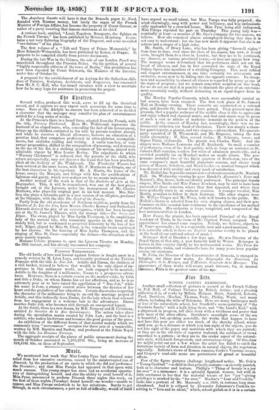31Intir.
We mentioned last week that Miss Louisa Pyne had obtained some relief from her excessive exertions, caused by the uninterrupted run of Dinorah, by the production of an opera in which she did not perform— the 73.ovatore ; and that Miss Parepa had appeared in that opera with much success. This young singer has since had an accidental opportu- nity of distinguishing herself, and also the ability to avail herself of it. Miss Pyne' announced to perform Dinorah three nights this week, on the first of those nights (Tuesday) found herself—no wonder—unable to a pear. and Miss Parepa undertook to be her substitute. Barely to get through, in such circumstances, a part so full of difficulty, would of itself have argued no small talent, but Miss Parepa was fully prepared : she acted charmingly, sang with power and brilliancy, and was enthusiasti- cally applauded by a crowded house. Miss Ppm) being still indisposed, Miss Parepa repeated the part on Thursday. This young lady was— nominally at least—a member of Mr. Gye's company for two seasons, we believe. How she remained almost unemployed during that time it is not easy to understand ; but she has now made it apparent that she is an actress and a singer of a high order.
Mr. Smith, of Drury Lane, who has been giving "farewell nights" from time to time, ever since the close of his season, has now, it would seem, brought them to a close in London, but they arc to be continued, we observe, at various provincial towns,—it does not appear how long. The manager seems determined that his performers shall not eat the bread of idleness, and has in fact converted the stars of the Royal Italian Opera into members of a strolling Company. This most refined and elegant entertainment, at one time certainly too aristocratic and exclusive, seems now to be falling into the opposite extreme. Its cheap- ness and accessibility to almost all classes is regarded by many as one of the signs of progress ; but we remain somewhat sceptical on this head, for we do not see that it is possible to diminish the price of an entertain- ment essentially costly, without detracting in an equal degree from its quality.
The Monday Popular Concerts, which were successfully carried on last season, have been resumed. The first took place at St. James's Hall on Monday evening. These concerts are conducted on a rational plan, and deserve the favour they have gained. They proceed upon the grounds, that a popular audience of the middle class is able to appreciate and enjoy refined and classical music, and that such mimic may be given at such a cost as admits of moderate demands on the pockets of the public. At the concert of Monday last, accordingly, there was no in- strumental orchestra nor band of choristers. There was simply a cham- ber quartet-party, a pianist, and two singers,—all excellent The quartet. party consisted of M. Wietriawski and Mr. Blagrove, taking the first violin alternately ; M. Ries, second violin ; M. Schreurs, tenor; and Signor Piatti, violoncello. The pianist was Charles Halle. And the singers were Madame Lcmmens and M. Reichardt. So small a number of performers, even of the first quality, with so large an audience as St. James's Hall contains, renders low rates of admission practicable, and a crowded assembly (as on Monday) makes an ample return. The pro- gramme included two of the finest quartets of Beethoven, two of the same composer's most beautiful pianoforte sonatas, and choice vocal pieces of Mozart, Schubert, and Mendels.sohn—a musical banquet which was devoured with avidity and every mark of satisfaction.
Mr. Hullah has begun his annual series of choral concerts at St. Martin's Hall. On Wednesday evening he gave Handel's Alexander's Feast and Bennett's Afay Queen, both excellently performed. The principal female singers, Miss Banks and Miss Fanny Rowland, may be said to have been nurtured at these concerts, where they first appeared, and where they have gradually risen to an eminent position. A younger vocalist, Miss Martin, promises to follow in their footsteps. The other singers were Mr. Wilbye Cooper and Mr. Weiss, both well known to the public. Mr. Hullah's chorus is selected from his own singing classes, and their per- formance on this occasion bore testimony to the excellence of his method of instruction. His orchestra is large, completed, and composed of the best instrumentalists in London.
Herr Pauer, the pianist, has been appointed Principal of the Royal Academy of Music, in the room of Mr. Cipriani Potter, resigned. This appointment has caused some surprise. Nobody, we believe, objects to M. Pauer personally ; he is a respectable man and a good musician. But it is naturally asked, is there no English musician worthy to be placed at the head of our national school of music ?
Reisseger died at Dresden a few days ago. He was Director of the Royal Opera of that city, a post formerly held by Weber. Reisseger is known in this country chiefly by his instrumental works. His Trios for the pianoforte, violin, and violoncello have for many years been popular among our amateurs.
M. Pais, the Director of the Conservatoire of Brussels, is engaged in bringing out three new works, La Biographie des Dfutieiens, La Philosophic de he Ifusigue, and L'Hictoire Gadrale de he Musique. The appearance of these works will create much interest; for, in musical literature, Fetis is the greatest name of the age.


























 Previous page
Previous page